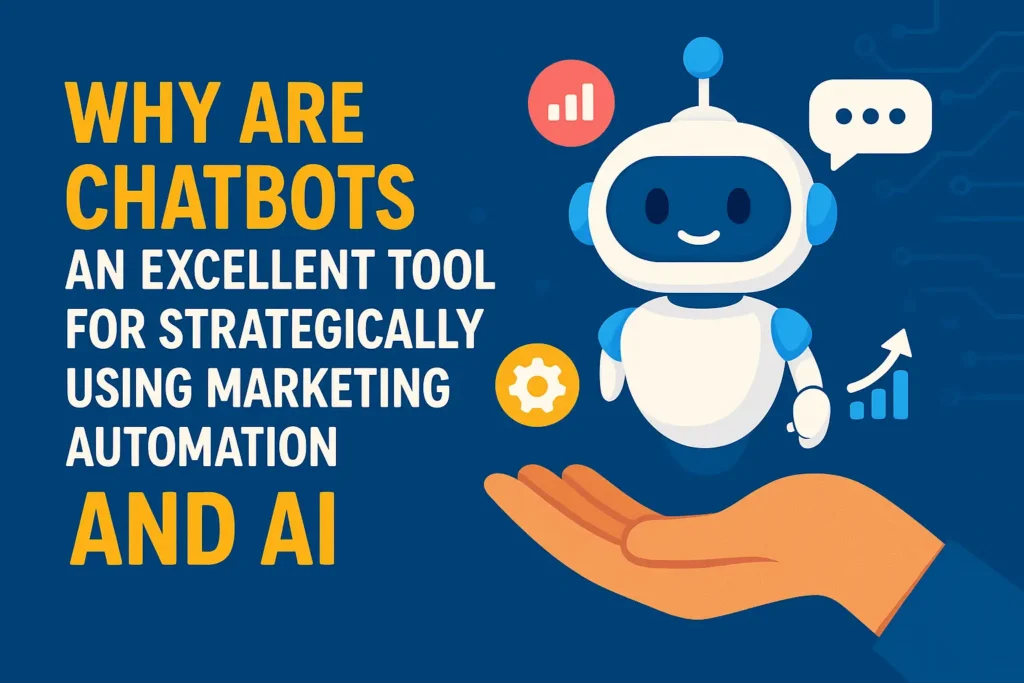In the ever-evolving landscape of artificial intelligence, language models have become the core drivers behind automation, creativity, coding, research, and numerous other applications. Among the top contenders in this space are DeepSeek and ChatGPT. Both are powerful AI models, but they cater to slightly different needs and use cases.
Whether you’re a developer, researcher, content creator, or a business owner exploring AI integration, it’s essential to understand how these two platforms differ and which is the right fit for you. This blog provides a detailed comparison of DeepSeek and ChatGPT, examining their features, performance, and ideal use cases to help you make an informed decision.
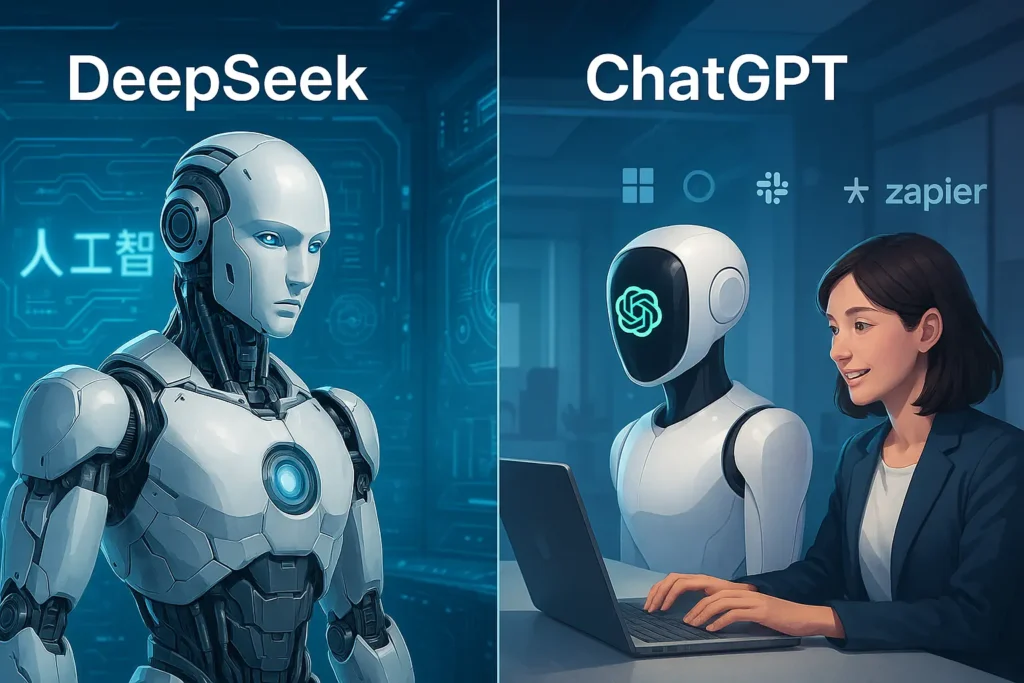
DeepSeek vs ChatGPT: Main Differences
| Feature | DeepSeek | ChatGPT |
|---|---|---|
| Primary Language | Chinese (optimised), with support for English | English (optimised), supports multiple languages |
| Model Type | Open-source LLM | Proprietary LLM (GPT-4 / GPT-4o by OpenAI) |
| Code Capabilities | Strong (especially in open-source and academic circles) | Very strong (widely adopted for code generation, debugging) |
| Customisation | High, especially with local deployment options | High via GPTs (custom instructions and APIs) |
| Accessibility | Requires technical setup for full use | Easy access via the OpenAI platform |
| Pricing | Free (open-source), depends on hosting | Freemium model (Free + Plus subscription) |
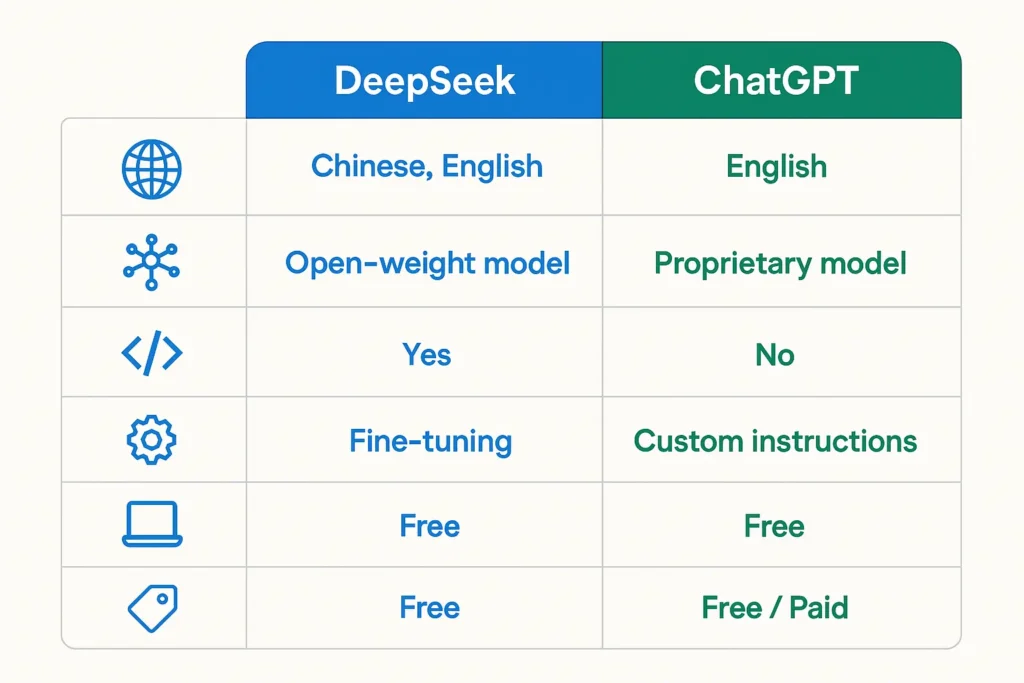
DeepSeek Overview
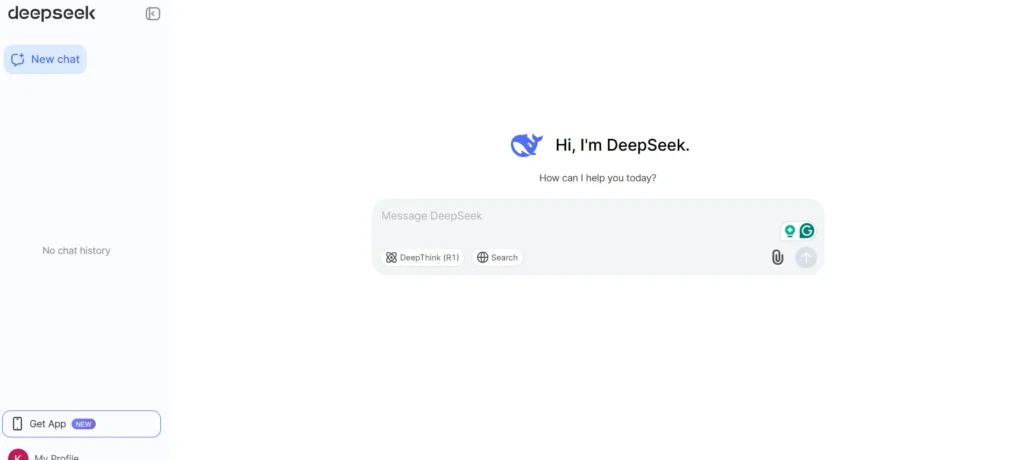
DeepSeek is a Chinese-developed, open-source large language model (LLM) designed to provide capabilities similar to those of OpenAI’s GPT models. Built with transparency and control in mind, DeepSeek is gaining traction among researchers, developers, and institutions that prefer open frameworks and want full access to model weights, training data references, and architecture.
It is part of a growing movement in the AI world that promotes open-source alternatives to closed, commercial models.
DeepSeek Key Features
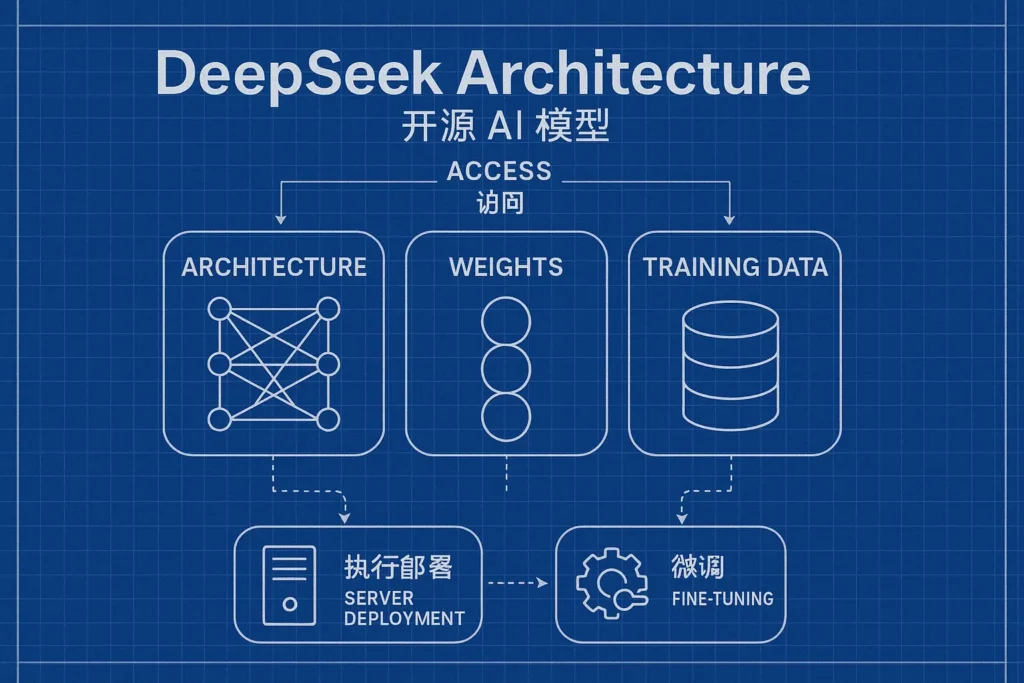
- Open-Source Architecture
DeepSeek is built on the principle of transparency. You can access the model architecture, training methodology, and even host the model on your servers. - Multilingual Support with Chinese Optimisation
While DeepSeek performs best in Chinese, it has reasonable English capabilities, making it a good choice for regional use or bilingual projects. - High Code Performance
Its code-generation and reasoning capabilities are on par with top-tier models, making it a good alternative for developers and technical teams. - Offline and Private Deployment
Ideal for institutions that need to maintain control over data and operations without relying on cloud-based APIs. - Custom Training and Fine-Tuning
You can fine-tune DeepSeek for specific business or research needs, thanks to its open framework. - Cost-Efficiency
Unlike subscription-based models, DeepSeek allows you to run the model for free on your infrastructure.
ChatGPT Overview
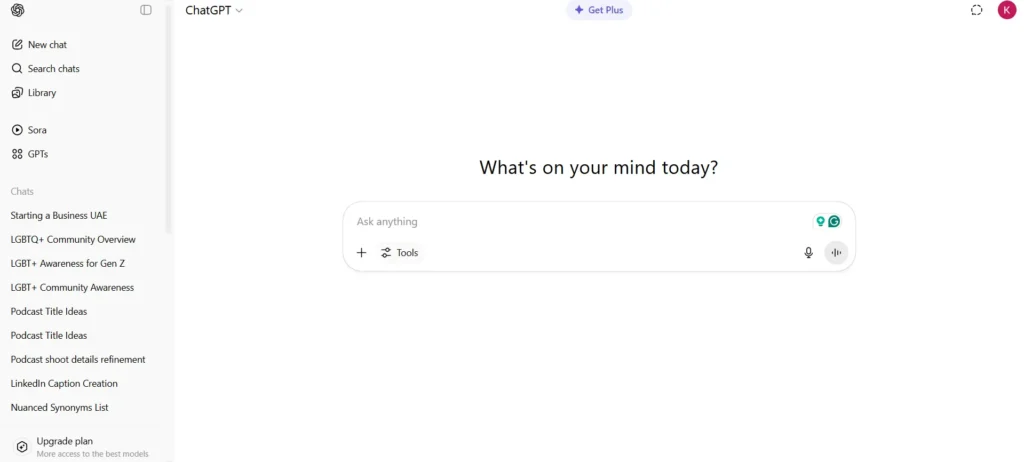
ChatGPT, developed by OpenAI, is one of the most well-known and widely used AI tools globally. Built on the GPT-4 (and the newer GPT-4o) architecture, it offers natural, human-like interaction capabilities across a wide range of domains, from writing and customer service to coding, tutoring, and research assistance.
It’s part of the OpenAI ecosystem and is accessible via the web, APIs, and integrations with platforms like Microsoft Office and Slack.
ChatGPT Key Features
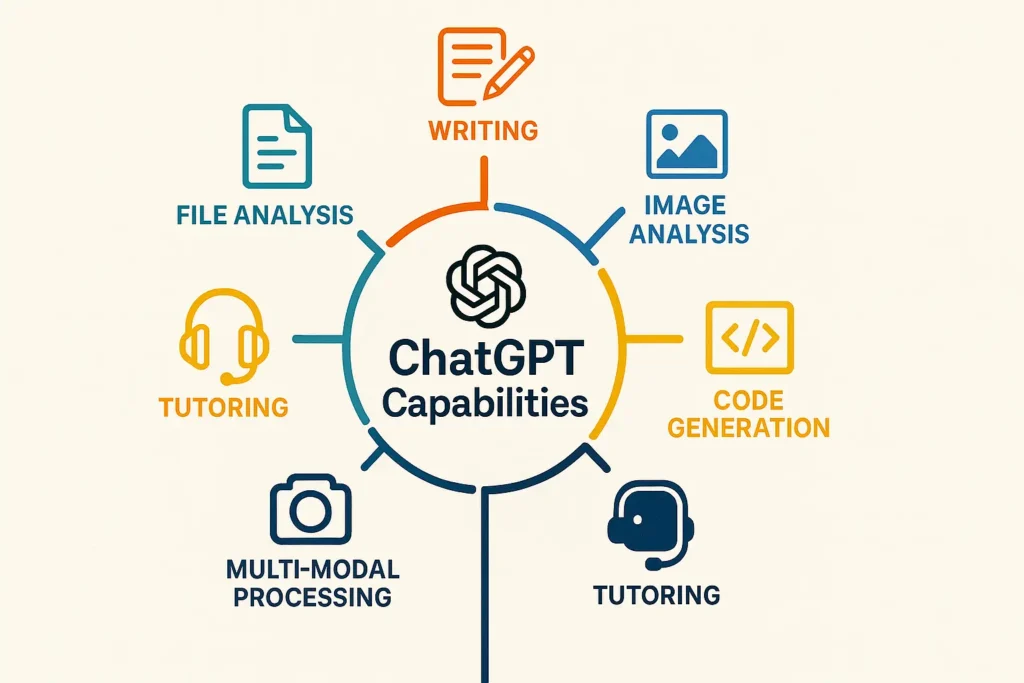
- Advanced Language Understanding
ChatGPT excels in generating human-like responses, understanding context, and maintaining coherent dialogue across long conversations. - Multi-Modal Capabilities (with GPT-4o)
With GPT-4o, ChatGPT can process text, images, audio, and video, enabling highly interactive and versatile applications. - Deep Knowledge Integration
ChatGPT includes up-to-date knowledge, access to plugins, browsing, and file analysis capabilities, depending on your plan. - Easy Customisation via GPTs
Users can create their own “GPTs” with custom instructions, files, and behaviour without needing coding skills. - Extensive Ecosystem
Integrated with Microsoft tools, Zapier, Slack, and more, ChatGPT fits seamlessly into business and personal workflows. - Safe, Moderated, and Scalable
OpenAI implements rigorous safety protocols, making ChatGPT suitable for enterprise deployment.
DeepSeek vs ChatGPT: Key Differences
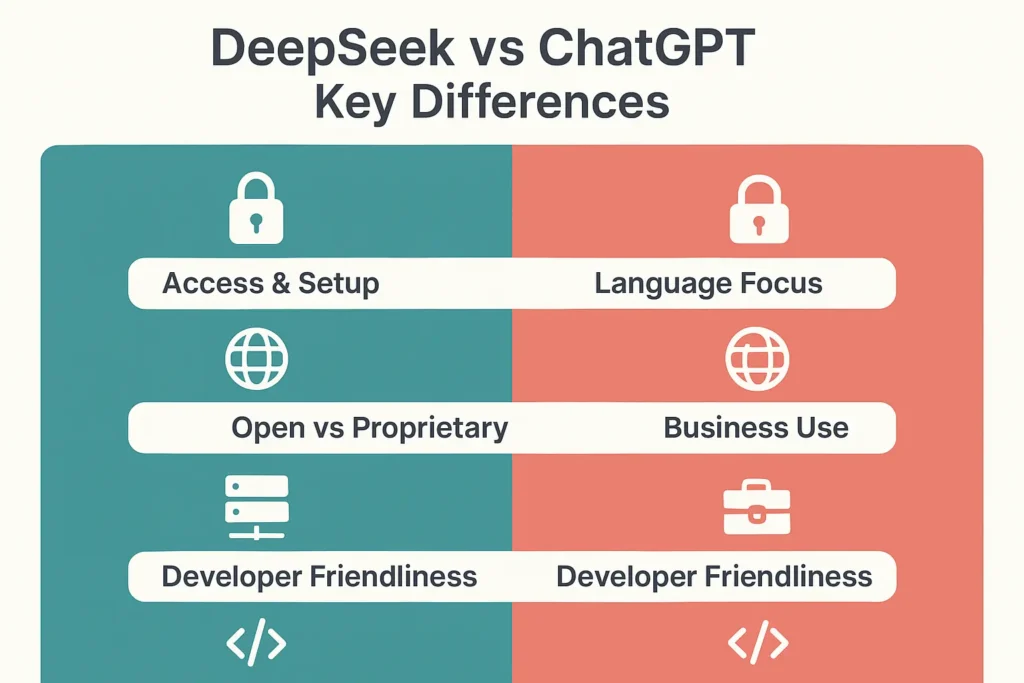
1. Access and Availability
- DeepSeek requires local deployment or technical setup, ideal for developers or institutions.
- ChatGPT is instantly accessible through a browser, mobile app, or API.
2. Language Optimisation
- DeepSeek excels in Chinese, making it suitable for regional applications.
- ChatGPT is optimised for English and offers robust multilingual capabilities.
3. Openness
- DeepSeek is open-source, meaning users have access to the entire model.
- ChatGPT is proprietary, offering no direct access to the underlying architecture or weights.
4. Business Use
- ChatGPT integrates well with business tools and offers enterprise plans.
- DeepSeek allows complete control and can be adapted internally without external dependencies.
5. Coding and Research
- Both perform well in coding tasks, but DeepSeek appeals more to the open-source community, while ChatGPT has better documentation, community support, and integrations.
Who Should Use DeepSeek?
Choose DeepSeek if:
- You’re a developer or AI researcher needing access to the model architecture
- You work with or in the Chinese language ecosystem
- You prioritise data privacy and want to deploy models locally
- You have the infrastructure to run large models and wish to avoid subscription fees
- You’re looking for a customisable AI solution for academic or institutional use
Who Should Use ChatGPT?
Choose ChatGPT if:
- You want an easy-to-use, versatile AI assistant without technical setup
- You need a multi-purpose tool for writing, coding, brainstorming, image analysis, and more
- You work in English or require a multilingual assistant
- You’re a business looking for ready-to-integrate AI services
- You prefer secure, cloud-based tools with support and regular updates
Is It Time to Switch to DeepSeek?
It depends on your goals.
If you’re looking for a cost-effective, open-source, and customisable AI solution, yes, DeepSeek is a substantial alternative worth exploring. It’s beneficial for organisations that prioritise data sovereignty or need AI capabilities without relying on third-party APIs.
However, suppose you need a plug-and-play, highly reliable, multi-modal AI assistant with industry-leading natural language capabilities. In that case, ChatGPT remains unmatched for the average user, creative professional, and enterprise teams.
Wrapping Up!
Both DeepSeek and ChatGPT are remarkable in their ways. DeepSeek offers freedom, flexibility, and transparency, making it a strong open-source alternative for technically adept users. ChatGPT, on the other hand, offers versatility, ease of use, and world-class AI performance for a global audience.
Your ideal choice will ultimately depend on your technical comfort level, use case, budget, and the kind of control you seek over your AI tools.
FAQ’s: DeepSeek vs ChatGPT
What is DeepSeek?
DeepSeek is an AI language model developed by a Chinese team, recognised for its open-source nature and support for multiple languages. It’s designed for research, development, and enterprise-level use, with a particular strength in reasoning tasks.
What is ChatGPT?
ChatGPT is an advanced conversational AI developed by OpenAI. It’s widely used for writing, coding, researching, and productivity tasks. The paid version (ChatGPT Plus) uses the GPT-4-turbo model.
Which AI is better for casual users?
ChatGPT is more user-friendly, featuring a polished interface, regular updates, and multiple tool integrations (such as a code interpreter, DALL·E, and web browsing) in its Pro plans, making it ideal for casual users.
Is DeepSeek free to use?
Yes, DeepSeek is open-source and free for individual use. It’s aimed at developers, researchers, and companies looking to customise and deploy AI models.
Which AI model is more accurate?
ChatGPT (GPT-4-turbo) generally performs better in natural language understanding and conversation fluency. DeepSeek-LLM is competitive in some benchmarks, especially in Chinese, but may lack polish in general use cases.
Does DeepSeek support multiple languages?
Yes, but it’s particularly optimised for Chinese and English. However, ChatGPT supports a broader range of languages and handles multilingual conversations better.
Can I use both models for coding help?
Yes. Both ChatGPT and DeepSeek support code generation and debugging. ChatGPT, however, has more robust support for interactive coding and data analysis, especially with the built-in Python tool in Pro plans.
Which is better for businesses and enterprises?
ChatGPT offers enterprise-level features with privacy, security, and admin controls. DeepSeek may be a better fit for businesses looking to customise or host their own AI solutions at a lower cost.
Is ChatGPT open-source?
No, ChatGPT is a proprietary product by OpenAI. However, OpenAI has open models like GPT-2 and Whisper (for speech). DeepSeek, on the other hand, is fully open-source.
How do I choose between DeepSeek and ChatGPT?
Choose ChatGPT if you want an out-of-the-box, high-performing conversational AI. Choose DeepSeek if you’re technically inclined and want to experiment with or deploy an open-source alternative.



